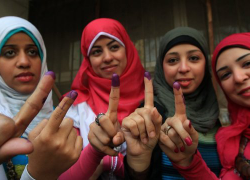Egyptians headed to the polls on Tuesday to vote on a constitutional referendum for the first day of a two day voting period. This will be the first vote in Egypt since the military disposed of President Mohamed Mursi, the only president to be voted into office through a democratic election. It is also the third referendum for Egyptians in three years. As a result of the unrest in Egypt since the removal of Mursi, this latest referendum has been eagerly anticipated. Not only has the pending vote brought hope and unrest, but it also will have lasting impacts to the country’s stability and the rights of Egyptian citizens.

The anticipation of the vote brought both financial growth and death to the country. The hope of a more stable government, after a potential Presidential election, if the referendum passes, brought the stock market to the highest levels since January 2011. It is expected that if citizens vote to accept the agreement there will be a new Presidential election as early as April. Not only is there expected to be an election, but one of the most promising candidates, General Abdel Fattah el-Sisi, the general who was instrumental in bringing down Mursi, has indicated that he will rule if Egypt would support him. Many citizens look at this referendum as a step in stabilizing the government by stopping the political upheaval and reinstating stability through el-Sisi’s impending election.
However, this referendum has brought unrest in addition to hope because the Muslim Brotherhood has fought the referendum. The Brotherhood fought the referendum by trying to put up posters opposing the referendum, largely because they see the referendum as an attempt to legitimize the forced removal of Mursi. The Muslim Brotherhood, who support Mursi, has also vowed to boycott the vote and consequently clashed with the security forces instructed to protect the voters and the election process. These clashes include security forces firing tear gas at Mursi supporters in Giza and bomb explosion in a poor neighborhood in Giza two hours before the balloting started. Although no one died in that bombing, interior ministry officials have said that at least five civilians have been killed in clashes leading up to Tuesday, and an additional eleven people died on the Tuesday, the first day of voting.
Not only has the referendum created unrest through the voting process, but also has a significant impact on the rights of the Egyptian citizens. One key effect of the referendum passing is the return of a president that is a member of the military, and accountable to both Egyptian citizens and the Egyptian military. This effect conflicts the responses Egyptians made when polled by CNN about the type of government they would prefer; eighty percent of people believe democracy is a good political system whereas five percent believe that it is good to have a strong leader, indicating that citizens are willing to sacrifice their ideal government for immediate peace. In addition to the probable reinstatement of a military leader, it also gives the military a special status to select their own candidates for positions and bring civilians before tribunals without oversight. Other changes would include banning political parties based on their religion, giving women equal rights, and protecting Christians as a minority.
Ultimately this referendum, which does have some good provisions such as banning all forms of slavery and sex trade, is a flawed document which has brought about more unrest than usual in recent days. The question that remains to be seen is whether the likely passage of the referendum improves conditions in Egypt. Those voting for it hope that the killing and violence will stop and that the country will stabilize, but the price of reinstating a military leadership may ultimately be a high price to pay: giving up many of the rights earned during the Arab Spring.
Katelin Wheeler is 3L student and Sutton Editor for the Denver Journal of International Law and Policy

